Lancelot/Descobriu Lancelot
La primera secció us porta en una visita guiada sobre Lancelot. La segona secció està dedicada a opcions i conceptes més avançats.
Informació general
Introducció
Lancelot és un menú llançador d'aplicacions per al KDE Software Compilation.
Lancelot o Kickoff?
Lancelot ofereix moltes característiques i opcions de configuració que Kickoff no. Per a una comparació més detallada, visiteu la comparació amb altres llançadors.
Kickoff és el menú llançador d'aplicacions per omissió per a KDE SC. Per a substituir Kickoff per Lancelot, cal que afegiu a través del plafó 'afegeix estris'. Per obtenir més informació sobre com afegir i treure estris per al plafó, veure el Com es fa de Plasma.
Lancelot o KRunner?
Lancelot es pot utilitzar com un cubstitut de KRunner. Veure la comparació amb altres llançadors per a una llista de beneficis.
Per omissió, es pot accedir a Lancelot a través de la drecera Alt + F5 (es pot canviar).
Ús bàsic
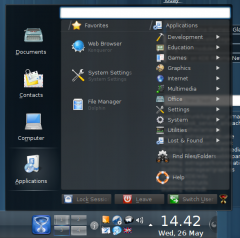 |
Lancelot, amb les opcions per omissió. |
En fer clic a la icona del llançador que heu afegit al plafó, s'obrirà el menú de Lancelot.
Aquest mostra quatre seccions: , , i .
Seccions
Aplicacions
La secció Aplicacions conté una llista de les vostres aplicacions preferides a la columna de l'esquerra, i les categories d'aplicacions a la dreta. Si l'aplicació que cerqueu no és a la llista de Preferits, podeu navegar per les categories de la dreta amb només seleccionar-ne una.
En submergir-se en les categories de la secció Preferits desapareixerà per proporcionar més espai per a la navegació. Sempre s'hi pot tornar mitjançant l'ús de la barra ruta de navegació a la part superior.
Ordinador
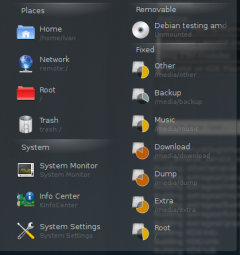 |
La secció Ordinador de Lancelot. |
La secció Ordinador conté una llista de llocs definits (com es veu en Dolphin), algunes aplicacions útils del sistema i una llista de dispositius d'emmagatzematge.
Podeu expulsar/muntar/desmuntar dispositius extraïbles directament des del menú simplement fent clic dret sobre el desitjat i escollint l'opció corresponent del menú contextual.
Contactes
La secció Contactes mostra la llista de correus sense llegir des de Akonadi (KMail) i els contactes en línia de Kopete.
Documents
La secció Documents mostra una llista d'aplicacions d'oficina a l'esquerra, i una llista de documents oberts actualment i recentment a la dreta.
Capacitats de fer cerques
Lancelot proporciona totes les funcions de cerca de KRunner. Es pot utilitzar per trobar aplicacions, per fer càlculs, executar ordres de BASH, com un convertidor d'unitats, etc. Per a més detalls, veure Ús de KRunner.
Si no us agrada fer servir el ratolí, es pot accedir a cada part de Lancelot a través del teclat.
| Acció | Tecla | Descripció |
|---|---|---|
| Passar d'una secció a l'altra. | Re. Pàg. i Av. Pàg. | Mostra respectivament la secció anterior següent. |
| Passar a la secció específica. | Alt + número | Alt + 1 per a Applicacions, Alt + 2 per a Ordinador... |
| Activar ítems. | Alt + lletra | Si un ítem té una lletra subratllada en el seu títol, es pot activar prement juntes les tecles Alt i la seva lletra. |
| Moure entre els ítems de la llista. | Les tecles Amunt i Avall | |
| Moure entre les columnes. | Les tecles Esquerra i Dreta | |
| Activar l'ítem seleccionat. | Intro | Si no hi ha cap ítem seleccionat, s'executarà el primer resultat de la cerca. |
| Obrir el menú contextual per a l'ítem seleccionat. | Alt + Intro | |
| Completació a la caixa de cerca. | Les tecles Tab i Final; Esquerra i Dreta | Les tecles Tab i Final utilitzen el suggeriment sencer mentre que Esquerra i Dreta mouen a través dels suggeriments. |
Temes més avançats
Conceptes avançats de la interfície d'usuari (IU)
Activació sense clic
In order to reduce repetitive strain injuries produced by clicking the mouse buttons, Lancelot can be operated, if desired, without a single click.
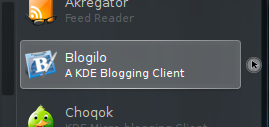
When you hover an item in the menu, a small icon that looks like a target with a mouse cursor drawn in it will appear. Instead of clicking, you can just hover the icon (or the area near it) and the item will be automatically activated.
Disposició adaptable
The layout of the menu differs depending on the position of the applet which invoked it.
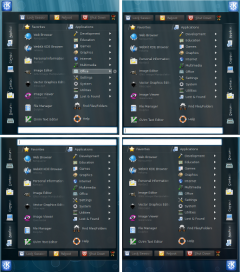
Always, the closest to the invoking applet (and the mouse cursor) are the section and system buttons, and the search box is on the opposite side since it has the focus by default and you don't need to click it in order to use it.
The sections are also reordered so that the Applications section is the closest to the mouse cursor.
Grandàries adaptables dels ítems
The less items a list has, the larger the items and bigger the area for clicking.
When there are more items, Lancelot tries to show them all at once by reducing the size. If there are too many items to be shown all at once, the scrollbars are used as a solution.
Personalització del menú
Mostra seccions a l'interior
If you think that the section buttons are too big and would be better if placed inside the panel itself, just right-click the applet, choose and .
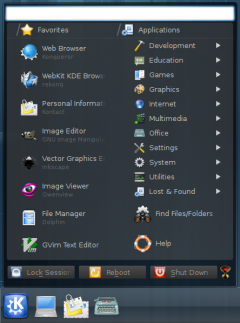
Mostra petits botons de secció
If you think that the section buttons are too big, but you don't want to place them inside the panel, just right-click them and choose .
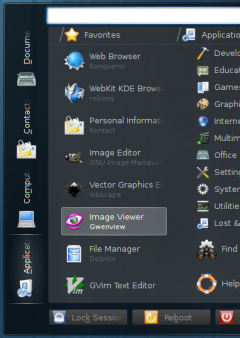
Personalitza les accions del sistema
If you don't use session switching (the 'switch user' feature), you can set different actions to the buttons in the bottom part of the window via the tab of the Lancelot's configuration dialogue.
Personalitza les aplicacions
You can choose which applications to show in the Documents and System sections via the tab of the Lancelot configuration dialogue.
Torna a ordenar els ítems
You can change the order of favourite applications just by drag and drop. Mind that for it to work, you need to unlock your desktop first.
Submenús en cascada
Some users prefer that the applications subcategories open in separate popups like they are used to from the classic menu from KDE 3. Since KDE SC 4.5, a new experimental feature was added to Lancelot which enables this behaviour.
To enable it, check the option in the tab of Lancelot's configuration dialogue.
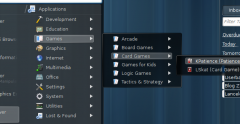
Components del menú de Lancelot a l'escriptori
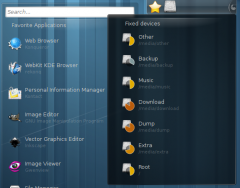
It is useful to have things that you use often placed on the desktop or the panel. For more info, see using the Shelf applet
